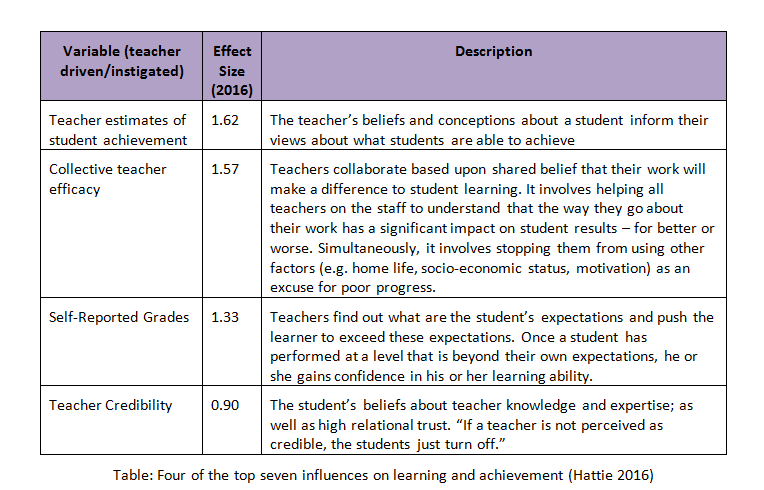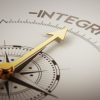The Power of Beliefs – the Influence on Learning Progression
- On 20-05-2017
You cannot become masterful through having mediocre beliefs and using mediocre habits.
In Part IV of the Transforming the School Narrative series we are examining the influence on learning progression of existing beliefs.
A Teacher’s Story
One of my all-time favourite TED talks is by the wonderful Rita Pierson, Every kid needs a champion. Rita was an American educator for at least 40 years and had worked in many roles in primary schools, junior high schools, and special education. It was clear in her talk that she felt that great learning was built on the relationship she created with each and every student. The most significant moment of her talk comes about half way through the talk when Rita shares about challenging the mindsets of a class;
“I have had classes that were so low, so academically deficient, that I cried. I wondered, “How am I going to take this group, in nine months, from where they are to where they need to be? And it was difficult, it was awfully hard. How do I raise the self-esteem of a child and his academic achievement at the same time?
One year I came up with a bright idea. I told all my students, “You were chosen to be in my class because I am the best teacher and you are the best students, they put us all together so we could show everybody else how to do it.”
One of the students said, “Really?”
I said, “Really. We have to show the other classes how to do it, so when we walk down the hall, people will notice us, so you can’t make noise. You just have to strut.”
And I gave them a saying to say: “I am somebody. I was somebody when I came. I’ll be a better somebody when I leave. I am powerful, and I am strong. I deserve the education that I get here. I have things to do, people to impress, and places to go.”
And they said, “Yeah!”
You say it long enough, it starts to be a part of you.”
This moment is so inspiring for me because Rita powerfully addresses her own beliefs about the students she will be teaching and the beliefs that the students have of themselves. She realised that if she did not address both of these unexamined beliefs then there was no possibility of taking the group “from where they are to where they need to be”.
The Influence of Beliefs
Whilst the educational challenge that Rita Pierson faced can be considered to be extreme there is something worthwhile to be drawn from her experience – it is critical to have strategies to address the ‘out-of-awareness’ beliefs and assumptions that teachers and students bring to the classroom.
Addressing the underlying beliefs and mindset is not only considered important by Carol Dweck it is also supported by John Hattie’s 2016 update to his visible learning meta-analyses. The table below shows an extract of the top seven influences on learning and achievement according to Hattie’s analysis. These four high-influence variables are all related to teacher and student beliefs. The high effect sizes appear to indicate that there would be a significant improvement if all teachers and schools systemically addressed the beliefs, conceptions and expectations that exist with the school.

Shifting the Underlying Beliefs
Recently a school approached me to run a session around unpacking growth vs fixed mindset and what practices they could enact to develop a growth mindset with their students. I decided on this occasion to start the process by creating a larger context of the influence of their beliefs and their own mindsets on student learning. I even gave them time to explore and discuss their internal dialogues (their self-talk) in various areas of their teaching and their lives. It was fascinating to see them begin to reflect upon and examine their common conversations about particular students, what they believed they were good at and what they avoided, and what they told themselves in their heads.
And it WAS only a beginning.
To be able to imagine and create a new context as Rita Pierson did requires a high level of self-reflection and self-awareness. It would require a certain level of demand on oneself. You cannot become masterful through using mediocre habits. Individuals who are elite performers in any field demand a lot of themselves mentally as well as physically. They have a context that drives them to do the small things that matter – the one percenters.
For teachers I believe that they would need to take on the context of growing and developing EACH and EVERY student if they hope to be masterful. Without that context essentially we are admitting that we will sell out on some students. If you think about it honestly – we already are and have been for a long time. We call it nice things like “teaching to the middle” but the reality is that a number of students do NOT grow in our classes. They tune out, become bored, they coast along happy with mediocrity or being good, they think they are dumb, they believe they are not good at something, they feel that other kids get it and they don’t – all because we don’t demand ourselves to be masterful.
This is why it is so important to transform the narrative in schools. We need to invest the time and really examine our own beliefs about our students and learning. Schools need to put in the systems and processes that have teachers deal with the reality of current student learning progress. Not in a “carrot and stick” approach but in a developmental approach with the commitment to grow the capacity of EACH and EVERY teacher. It may be confronting but an honest, thoughtful reflection will make a bigger difference than enacting yet another pedagogical initiative.
Some Questions for you to think about
- How often do you take the time to examine your internal dialogue about your students or a topic?
- Are there areas you believe you have a fixed mindset in? What do you tell yourself?
- In the areas you believe you are masterful what do you tell yourself?
- What structures or processes could your school employ to develop the community’s capacity to be self-reflective?



0 Comments